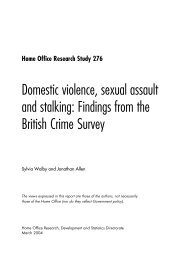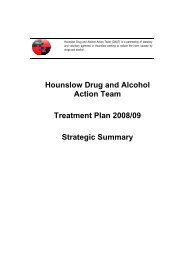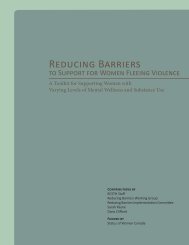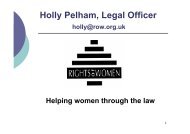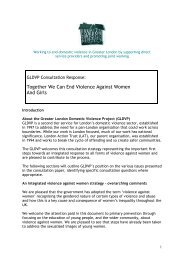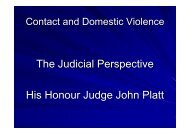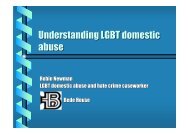1 Domestic violence information
Theory and Practice for the Substance Misuse Sector (pdf - AVA
Theory and Practice for the Substance Misuse Sector (pdf - AVA
Create successful ePaper yourself
Turn your PDF publications into a flip-book with our unique Google optimized e-Paper software.
The criminal law<br />
If you call the police<br />
Always call 999 in an emergency so the police can provide immediate<br />
help. They may arrest a violent perpetrator if they have committed a<br />
criminal offence. It is their decision whether to arrest or not and not<br />
the survivor’s.<br />
The Metropolitan Police Service has a positive action policy in relation<br />
to domestic <strong>violence</strong> so an investigating officer should complete a<br />
124D form (which involves conducting a risk assessment of the<br />
survivor) and justify the reasons why an arrest has not been made if<br />
there is the power to do so i.e. a criminal offence has been committed.<br />
The police will then pass the case to the local police Community Safety<br />
Unit. Community Safety Units are the investigation teams for domestic<br />
<strong>violence</strong> (as well as race and homophobic crime). They can also<br />
support survivors in finding ways to keep safe. You can find their<br />
number through your local police station or in the phone book.<br />
The police will take a statement from the survivor. The survivor should<br />
be given a copy of this statement and be given contact details for<br />
domestic <strong>violence</strong> support services. The survivor will be asked to<br />
sign their statement to say that it is true. The police will also gather<br />
other evidence that may be available such as medical records,<br />
statements from neighbours and they should also take photographs<br />
of any injuries sustained.<br />
It is not possible for a survivor to press or withdraw the charges. It<br />
is a common myth that this is the survivor’s decision, but in fact only<br />
the police and the Crown Prosecution Service can decide whether to<br />
charge and prosecute. The only action the survivor can take is to<br />
withdraw their willing co-operation with the prosecution. If there is still<br />
enough evidence of the crime, the case may still go to court and the<br />
survivor may be compelled by law to give evidence.<br />
If a violent partner is arrested<br />
If they’re arrested they’ll be taken to the police station. If charged<br />
with a crime, they may be released on bail while the police complete<br />
their investigation. Usually, there’ll be conditions attached to the bail<br />
such as an order to stay away from and not communicate with the<br />
survivor either directly (e.g. in person or by phone) or indirectly (e.g. by<br />
sending messages via someone else). If they ignore these conditions,<br />
they can be arrested and may be kept in custody until the court case.<br />
If the perpetrator pleads guilty the victim doesn’t have to go to<br />
court. They may however be asked to give a ‘victim impact statement’<br />
to describe the effect the abuse has had on them. This would be<br />
considered when the court decides the sentence.<br />
If the perpetrator pleads ‘not guilty’ the survivor may have to go to<br />
court to give evidence. If this happens it may be useful to contact<br />
your local Victim Support or an Independent <strong>Domestic</strong> Violence<br />
Advocacy Service (IDVA) who can answer any questions about the<br />
court process. IDVAs can also attend court with a survivor.<br />
The Crown Prosecution Service may also have a meeting with a<br />
survivor before the court case to find out if there are things they can<br />
do to help them to give evidence, such as see if they are eligible for<br />
special measures (for example, a screen to be used in court) or for<br />
video recorded evidence to be given.<br />
If the violent partner is harassing the survivor (calling repeatedly,<br />
coming round uninvited, etc.) a survivor can report it to the police<br />
and they can issue the perpetrator with a formal caution under the<br />
Protection from Harassment Act.<br />
If the abuse does not stop after being cautioned, the perpetrator can<br />
be arrested and could face up to 5 years in prison. This makes it more<br />
powerful than an injunction and incurs no financial cost to the survivor.<br />
108<br />
© Stella Project Section 3 - <strong>Domestic</strong> Violence<br />
© Stella Project Section 3 - <strong>Domestic</strong> Violence 109



